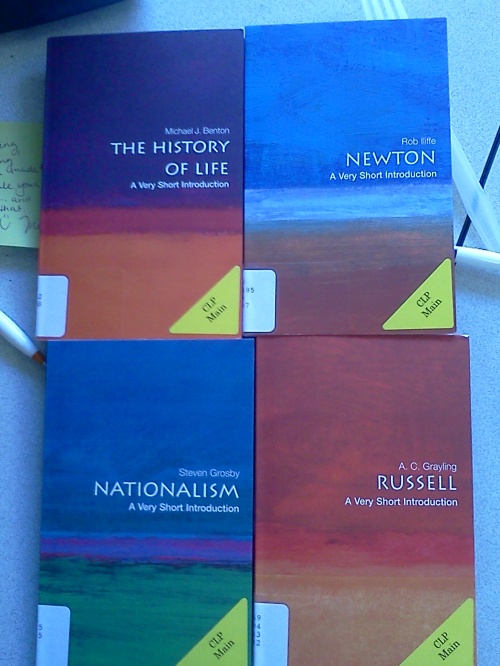All right class, raise your hand if you’ve ever had the feeling that you didn’t make the most of the educational opportunities offered to you in your youth. Whether you dropped out or just got an occasional B+ instead of straight A’s, do you ever wonder what could have been if you had just applied yourself a little more?
You’re certainly not alone: a Northwestern study published in 2011 asked a sample of adults to name one regret that really stands out in their memories, and 13% of respondents passed up lost loves, trips not taken, and childhood cruelties to identify a missed educational opportunity as a source of regret. I suspect it’s a common theme among adults — maybe as a kid you spent most of physics class studying the trajectory of a spitball, and now you can’t resist refreshing NASA’s Twitter feed when there’s a big announcement pending. Or perhaps your interest in verse during 7th grade English was limited to finding that just right word to rhyme with “smells” in an ode to your sister, but now you make sure not to miss a reading or 3 Poems By session here at the Library.
Now, we all know there are great pleasures to be found in being a full time student of the People’s University. I’m sure I would have pulled a much better GPA in 10th grade had my schedule resembled my current reading list…
- First period, American Horror 101
- Second period, Country Blues in Open D
- Third period, Advanced Vegan Junk Food
- Lunch
- Fourth period, Zen Agricultural Studies
- Fifth period Culturally Subversive Mid Century Sci Fi
- Six period, Backyard Botany
- Seventh period, Space Will Blow Your Mind
and so forth. (n.b. Obviously pleasure reading and formal schooling are two different things, and I’m sure my dream schedule would be someone else’s [namely, my wife’s] nightmare schedule.)
I think the dream of a lot of us academic underachievers, however, is that we could somehow suddenly have a broad, traditional, liberal education behind us. Do I want to learn Greek? Um, maybe next year. But do I wish I already knew Greek? Heck yeah!
The publishing industry has long recognized this impulse of wanting to take the easy path to enlightenment. Dr. Eliot‘s prescription at the beginning of the Twentieth Century — 15 minutes a day of hard reading — was supported by a widely-advertised series of books that promised readers the opportunity to become well-educated generalists with just a little effort. The Harvard Classics, and a number of similar publications such as those put out by Library of America, Oxford World Classics, Everyman’s Library, and The Great Courses have long been a great boon for educational late-bloomers as well as people for whom good schooling wasn’t available, offering anybody with access to a library (or some cash to spend on books) the chance to participate in intellectual life that may have otherwise been out of reach.
Even now, in an age in which anyone with access to broadband can sit in on MIT courses, there’s something welcoming about limiting your self-guided education to a book or two on a given topic. After all, it wouldn’t be hard to spend your 15 minutes a day clicking deeper and deeper into a hyperlinked detail in a Wikipedia article, and who needs all of those diversions when there’s a liberal education to be had?
In my opinion, there’s no better resource for the time-pressed aspirational reader than Oxford University Press’ “Very Short Introduction” series. These tiny books — typically between 100 and 150 pages and perfectly sized to fit in the back pocket of a pair of Levis — offer the broadest treatment of the most difficult subjects imaginable, written by top experts for a lay audience.
Imagine if you ran into an CMU professor at a party and, over the course of a drink, she explained her research using analogies, real-life examples, and maybe a quickly drawn graph on a napkin. These are the book version of that.
There are hundreds of these things, covering topics from Angels to Writing. (I guess they haven’t gotten to X-rays, Yemen, or Zoroastrianism yet.) Some topics seem to better lend themselves to this treatment; I find the natural sciences, psychology, and theology are strengths in this series. But really, I haven’t found a dud in the bunch. I recently had a good time reading Very Short Introductions to dinosaurs, Bertrand Russell, and the Old Testament. And while I certainly can’t say that I’m now an expert on these subjects, or even have an above-average knowledge of them, I figure that I’ve retained about as much as I would if I had payed attention in school, which is really all I’m after.
Perhaps the American Library Association should have a marketing campaign — “Make up for your misspent youth @ your library!” It has a nice ring to it…
-Dan









Reblogged this on Sotto Voce and commented:
I really enjoy the blog postings by this group of librarians. The posts always contain a book recommendation or two and the writing is fun.
I was a highly successful academic student in high school, but my regret now is that I didn’t take anything practical, like Home Ec. Wish I’d learned to sew and cook. At least my one quarter of typing forty years ago prepared me for constant “keyboarding” in the 21st century!
No regrets here! I have learned far more on my own than school could have provided! (With the exceptions of the hard sciences, but no regrets there, either, honestly. How can we judge ourselves via wisdom we have now over wisdom we didn’t have at the time?)